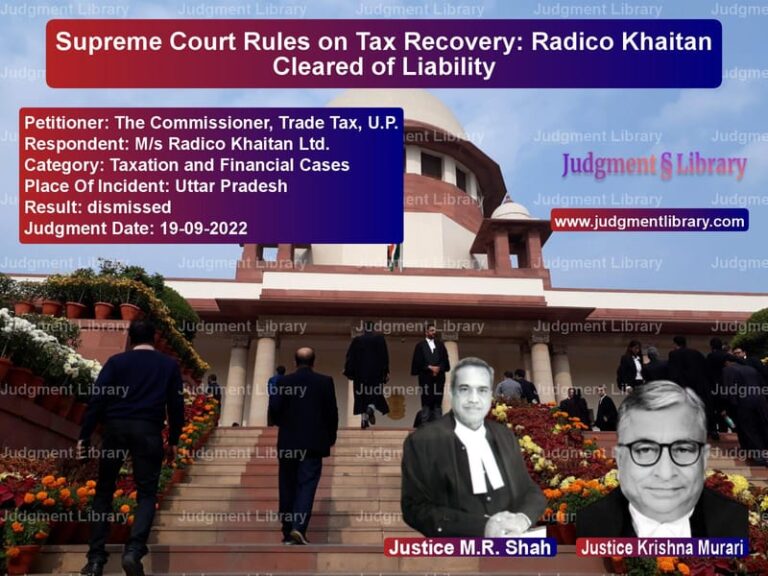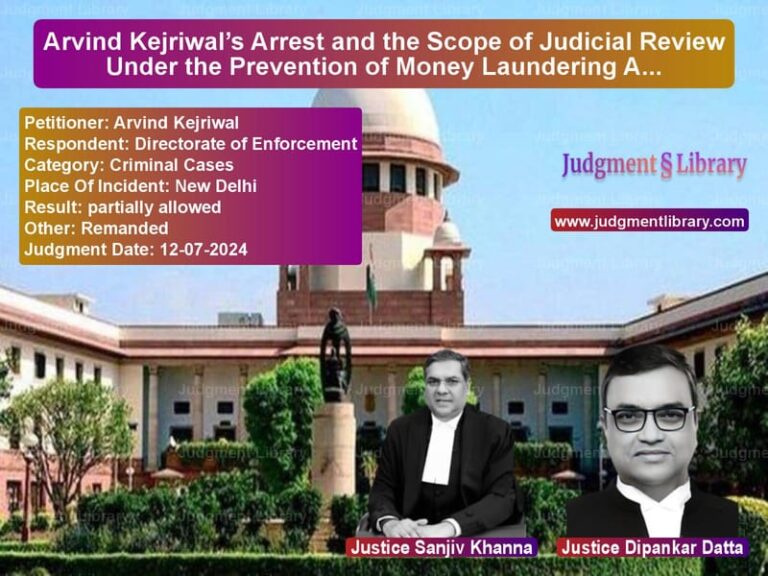Foreign Contribution Regulation Act Amendments: Supreme Court Upholds Stringent Rules
The Supreme Court of India recently ruled on the constitutional validity of the amendments made to the Foreign Contribution (Regulation) Act, 2010 (FCRA) through the Foreign Contribution (Regulation) Amendment Act, 2020. The amendments significantly tightened the regulations on receiving and utilizing foreign contributions in India. The Court upheld the changes, emphasizing their necessity in maintaining national security, public order, and the sovereignty of India.
Background of the Case
The petitioners in this case, including Noel Harper & Ors., challenged the amendments under Article 32 of the Constitution. They argued that the new restrictions imposed by the 2020 Amendment Act were arbitrary, unreasonable, and violated their fundamental rights under Articles 14, 19, and 21.
The amendments under challenge included:
- Section 7: Prohibited the transfer of foreign contributions to any other person.
- Section 12(1A): Made it mandatory to open an FCRA Account in the State Bank of India, New Delhi.
- Section 12A: Required the submission of Aadhaar numbers for identification of key functionaries.
- Section 17(1): Mandated that all foreign contributions be received only in a single account at the designated branch of the State Bank of India in New Delhi.
Petitioners’ Arguments
The petitioners argued that these amendments:
- Imposed an unreasonable burden on non-profit organizations that rely on foreign contributions for their operations.
- Violated Article 19(1)(c) by restricting the right to form associations freely.
- Violated Article 14 due to their arbitrary and excessive nature.
- Made the administrative process unnecessarily cumbersome, especially for grassroots organizations.
- Unfairly required Aadhaar identification for key functionaries, despite privacy concerns.
Respondents’ Arguments
The Union of India defended the amendments, arguing that:
- The changes were necessary to curb misuse and misallocation of foreign funds.
- There was an increase in malpractices and violations, necessitating tighter regulations.
- The prohibition on transfers was introduced to ensure accountability in the utilization of funds.
- Requiring Aadhaar for key functionaries was an essential step to ensure transparency.
- Centralizing foreign fund deposits at a single bank branch was aimed at better monitoring and control.
Supreme Court’s Observations
The Supreme Court bench, comprising A.M. Khanwilkar, Dinesh Maheshwari, and C.T. Ravikumar, upheld the amendments, stating:
“There is no fundamental right to receive foreign contributions. The State is entitled to ensure that foreign funds do not influence or interfere with the democratic polity of the country.”
The Court ruled that:
- Section 7: The prohibition on transferring foreign contributions was reasonable, ensuring that recipients utilize the funds themselves for the designated purposes.
- Section 12(1A) & Section 17(1): The requirement to open an account in a designated bank was a reasonable restriction aimed at improving transparency.
- Section 12A: While Aadhaar was mandated for identification, the Court held that an Indian passport could also be used as an alternative for key functionaries.
Final Judgment
The Supreme Court upheld all the challenged provisions, with the only relaxation being that Indian passport holders could submit their passport details instead of Aadhaar for identification under Section 12A.
Read also: https://judgmentlibrary.com/neet-pg-internship-deadline-dispute-supreme-court-upholds-cut-off-date/
Implications of the Judgment
This ruling has far-reaching consequences for NGOs and charitable organizations in India:
- All foreign contributions must be received only through a designated account in the State Bank of India, New Delhi.
- Organizations cannot transfer foreign contributions to other NGOs, requiring them to use the funds themselves.
- Increased compliance and scrutiny for organizations receiving foreign contributions.
- Potential administrative burdens on grassroots NGOs that previously relied on funding through intermediary organizations.
Conclusion
The Supreme Court’s judgment reinforces the government’s stance on stricter control over foreign funding to ensure national security, transparency, and accountability. While NGOs will have to adapt to the stricter regulatory framework, the ruling ensures that foreign funds are used strictly for permitted purposes under FCRA regulations.
Petitioner Name: Noel Harper & Ors..Respondent Name: Union of India & Anr..Judgment By: Justice A.M. Khanwilkar, Justice Dinesh Maheshwari, Justice C.T. Ravikumar.Place Of Incident: India.Judgment Date: 08-04-2022.
Don’t miss out on the full details! Download the complete judgment in PDF format below and gain valuable insights instantly!
Download Judgment: noel-harper-&-ors.-vs-union-of-india-&-anr-supreme-court-of-india-judgment-dated-08-04-2022.pdf
Directly Download Judgment: Directly download this Judgment
See all petitions in Fundamental Rights
See all petitions in Constitution Interpretation
See all petitions in Public Interest Litigation
See all petitions in Judgment by A M Khanwilkar
See all petitions in Judgment by Dinesh Maheshwari
See all petitions in Judgment by C.T. Ravikumar
See all petitions in dismissed
See all petitions in Quashed
See all petitions in supreme court of India judgments April 2022
See all petitions in 2022 judgments
See all posts in Constitutional Cases Category
See all allowed petitions in Constitutional Cases Category
See all Dismissed petitions in Constitutional Cases Category
See all partially allowed petitions in Constitutional Cases Category







